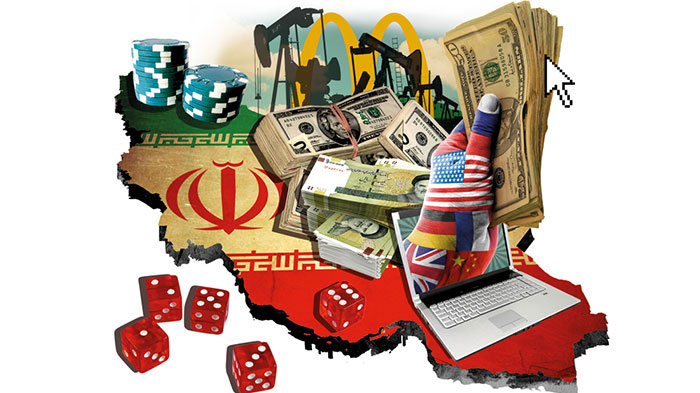Sanctions Indirectly Cause Iran’s Sluggish Post-Sanction Return

Nuclear sanctions that forced Iran to sell its oil through private-sector individuals and institutions, an unconventional way in international trade, eventually led to corruptions. The rise of the likes of tycoon Babak Zanjani caused by oppressive sanctions has provided a pretext for international institutes to list Iran on top of countries with high risks of money-laundering. This in turn impedes domestic as well as foreign investment, vital for the country’s much-needed economic renaissance.
The 2016 edition of Basel Anti-Money Laundering Index recently placed Iran on the top spot of its high-risk countries with an overall score of 8.61, standing above Afghanistan and Tajikistan. Iranian officials have called the report politically motivated, but Iran’s ranks by other global standards including transparency and administrative corruption are not much better despite slight improvements in transparency and ease of business after the nuclear deal was sealed last year.
Most of Iran’s allegations of money laundering concern the country’s aids to foreign institutions and groups, which Tehran has kept no secret. Massoud Daneshmand, a member of Iran’s Chamber of Commerce, tells Ebtekar, a reformist newspaper, that Iran’s banking and economic activities are all transparent and thus, “Iran’s membership in financial transparency organizations could resolve the allegations regarding money laundering”.
Ebtekar asserts that corruption on the part of those profiteers of the sanctions has exposed Iran as a risky destination for foreign investment. Foreigners' hesitation to invest in Iran indicates the country’s weak economic system, imbalanced distribution of wealth, inefficient distribution of resources and the lack of economic stability, Joubin Saffar writes.
The so-called crippling sanctions have had their own lessons for Iran. Iran’s Supreme Leader has repeatedly called for immediate reforms toward ‘resistance economy’. Despite a common misreading, Ayatollah Khamenei’s version of resistance economy does not require the country to cut ties with the world. Instead, it should look inward to immunize itself and stand on its own feet. “Resistance economy does not mean that we should confine ourselves inside the country. It is endogenous but outward-looking. It is in cooperation with global economies and stands tall against other economies,” the Supreme Leader said during a speech in Mashhad as early as March 2014.
Heidar Mostakhdemin Hosseini, an advisor to Iran's Minister of Economic Affairs and Finance Ali Tayebnia, notes that Majlis has approved the Fighting Money-Laundering act during the second term of the Ahmadinejad administration. The bylaws and directives were immediately prepared and notified to banks as well as monetary and financial institutions, he said. He also tells Ebtekar that a headquarters for financial information is established in the Finance Ministry, assigned to fight against money laundering. The center is reporting on the progress made in the fight domestically and internationally.
Economist Mahmoud Jamsaz however says the law is not firm enough. “A glance at the provisions of the law shows us that most embezzlements, jobberies, and illegal wealth accumulations uncovered in Iran, with others yet to be revealed in the future, are all somewhat in accordance with the law,” he told Ebtekar. “Unfortunately, the sanctions caused huge monetary and financial corruptions with the help of in-house administration agents because oil had to be sold but people who were authorized to do so did not return the revenues and took a billion dollars belonging to the country out,” he added. “These huge amounts of money are usually turned into small packs in gold, specie, silver and forex markets,” he said.
With all the obstacles on Iran’s way to join the global economy, the pendulum of hope sometimes swings 180 degrees. In late June for example, a policy-making international body that monitors money-laundering decided to keep Iran blacklisted as a high-risk country but welcomed Iran’s promises to improve and called for a one-year suspension of some restrictions on Tehran, Reuters reported. The EU has expressed support for Iran’s membership in WTO and similar voices are heard from the United States.
However, these have been met by strong cynicism from the hardliners of the principlist front as developments that question Iran’s independence. Iran’s FAFT agreement which is now apparently set to be revised in Majlis, provides a good example. And Rouhani’s administration does not seem to have the leverage to fight back. Delay in such reforms would mean delay in achieving tangible results of the JCPOA.

